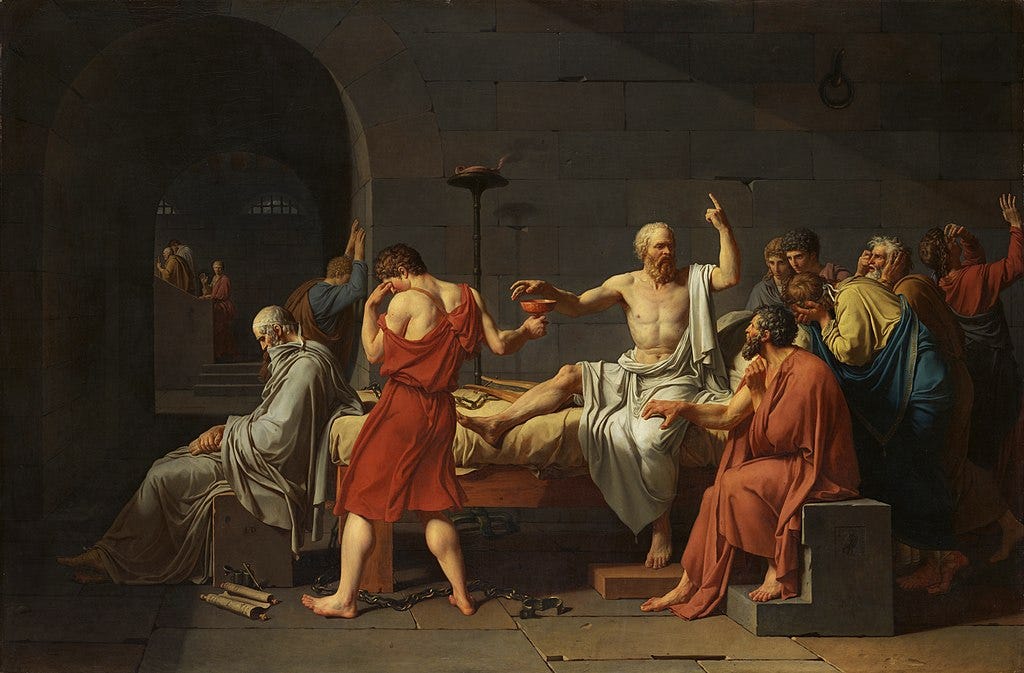Are You Sure You're Not Something More? | The Consolation of Philosophy Essay 1
We're Reading Boethius's the Consolation of Philosophy In the Next 5 Weeks. Come Join us!
Welcome to the Parker’s Ponderings read-along of The Consolation of Philosophy by Anicius Manlius Severinus Boethius. This is one of the most influential philosophy books in the entire Western canon. It’s a short read, in that the Penguin Classics edition is only ~134 pages, but it is philosophically dense—it’s chock-full of rich and deep philosophy, philosophical puzzles, existential questions, and theological insight. I was considering reading through it at a quicker pace since we read through Dune in just 6 weeks but each chapter (book) of the Consolation has at least a week’s worth of ponderables for us.
So, we'll do 1 chapter a week for 5 weeks and I’ll share a companion essay each week starting today. If you’re behind, no worries, you can catch up quick. We’re reading the Penguin edition, you can grab that here, but if you have a different edition then use whatever you have. Below is the read-along schedule. I will release the companion essays on the following schedule. That doesn’t mean you have to have the reading done by that date though. Say you haven’t read book 1 yet. You have from now until August 6th to read book 1 and my companion essay for it to stay current. But the reading should go fairly quick for you—it’s the concepts and arguments that’ll get cha! Boethius is deep.
All the read-along essays are free to read but the 2 Zoom call book club sessions are for paid subscribers, so make sure you upgrade to a paid subscription if you want in on our live discussions or want access to the recordings of those sessions.
Reading/Companion Essay Schedule
July 30th - Essay on Ch. 1
Aug 6th - Essay on Ch. 2
Aug 13th - Essay on Ch. 3
August 16th (Saturday) @ 4pm central time - Book Club Zoom Call 1
Aug 20th - Essay on Ch. 4
Aug 27th - Essay on Ch. 5
August 30th (Saturday) @ 4 pm central time - Book Club Zoom call 2
Okay, let’s jump in with Companion Essay #1 but be forewarned, this will be long! I have to do a little introduction to Boethius and his project. None of the other 4 companion essays will be nearly so long, I (fingers crossed) promise.

Who Is Boethius? What is the Consolation?
Anicius Manlius Severinus Boethius was born in 480 AD and was executed somewhere between 524 and 526 AD. He was born to a Roman aristocratic family right around the fall of the Roman Empire in the West. He was a brilliant scholar who set out to translate all the works of Plato and Aristotle into Latin from Greek, partially for the sake of educating his contemporaries and partially to demonstrate that the two philosophies aren’t actually in conflict as most had believed.
Boethius didn’t accomplish his translation goals, however, largely because he became a political prisoner and was wrongfully executed after a period of house arrest.
But before his execution, Boethius coined the term ‘quadrivium’ to stand for the latter 4 of the 7 liberal arts: geometry, arithmetic, astronomy, and music (the first 3 being the ‘trivium’ which is constituted by grammar, logic, and rhetoric). Additionally, Boethius also penned one of the most influential philosophy and theology books ever, The Consolation of Philosophy, amongst his other achievements.
C.S. Lewis, in his book The Discarded Image, says that Boethius is “after Plotinus, the greatest author of the seminal period [roughly 205 - 533 AD, ‘seminal’ in that it gave rise to the Medieval period which followed], and his De Consolatione Philosophiae was for centuries one of the most influential books ever written in Latin.” (The Discarded Image, 75).
Lewis goes on to say that “Until about two hundred years ago [closer to 300 years now] it would, I think, have been hard to find an educated man in any European country who did not love it. To acquire a taste for it is almost to become naturalised in the Middle Ages.” (The Discarded Image, 75).
So The Consolation is a big deal. But what prompted its writing? Well, an Ostrogoth named Theoderic invaded Ravenna in 489 and after a 4 years siege, Theoderic was crowned king—the first ‘barbarian’ king in Italy. Theoderic was an Arian ‘Christian’, Arianism being that heretical view that claims that the divine Logos, the Son, is a created being instead of being uncreated, co-eternal, and consubstantial with the Father. Boethius was a trinitarian Christian. But apparently that didn’t bother King Theoderic as he made Boethius Master of Offices in the Ravenna count—which basically made him the guy to see if you wanted an audience with the king.
But in one way or another, Boethius made some political enemies, one of them being a guy named Cyprian. Cyprian told Theoderic that Boethius’s friend Albinus was talking smack about him (the king) to the Pope in the east. Boethius went to bat for Albinus and said “Cyprian’s charge is false. But if Albinus so acted, then I and the whole senate acted with one mind. It is false, my lord king.” (Anon. Vales. 85). Some how Theoderic misconstrued Boethius’s defense of Albinus and Cyprian went on to accuse Boethius of treason alongside Albinus—and sacrilege on top of the treason, sacrilege in the form of the black arts of magic!
The charges were completely false. But then why did Theoderic buy into them? Maybe it was because he was beefing with the Roman emperor of the remaining eastern territory, Justin, and Theoderic was trying to use Boethius as a bargaining chip to get Justin to lay off the Arians here was beginning to persecute in the east? Or maybe Theoderic actually did take exception to Boethius’s defense of trinitarian theology? It’s hard to say what his motives might have actually been, but he had Boethius confined to some form of prison/house arrest, gave him no opportunity to defend himself, and eventually had him strangled and bludgeoned to death with a club—an unthinkable death for a Roman government to perform on a Roman citizen, especially one of Boethius’s stature, but a more commonplace punishment for a barbarian Goth king to carry out.
But it’s just before this horrific execution that Boethius’s Consolation of Philosophy is set. The book is something of a Platonic dialogue, but has a good deal of Ciceronian influence as well. Boethius scholar P.G. Walsh says that Boethius probably had Cicero’s Tusculan Disputations—where he investigates the true meaning of happiness—and his De Finibus—where he investigates the highest good—in mind when he wrote the Consolation, especially since all three works have a similar 5 book structure. But his title is an homage to the ‘consolatio’ style of writing, which Walsh says was inaugurated by Crantor of Soli and was made famous by Cicero’s treatise lost consolatio which he wrote to console himself after the death of his daughter.
Likewise, Boethius is definitely influenced by St. Augustine’s Soliloquies. ‘Soliloquy’ from the Latin solus (alone) and loqui (speak) is a term coined by Augustine to describe his dialogues with the personification of his own reason. By personifying his own thought process, Augustine was able to interrogate his own thoughts and come to a better understanding of what he believed and why he believed it.
Boethius is certainly doing the Augustinian philosophical soliloquy with his Consolation but he’s putting more flesh on the bones of his soliloquy than Augustine did, making it read more like Plato or Cicero.
Boethius scholar, Victor Watts, argues that,
“the Consolation is a skilled fusion of more than one genre. In part it approximates to the monologue, and in part it imitates the dialectic of the Platonic dialogue. The whole, in fact, is cast in the form of a particular type of dialogue, the sacred dialogue, in which the author describes how some divine spirit or power, at first unknown to him, appears and reveals to him some portion of hidden wisdom…” (Introduction to the Penguin Classics edition of the Consolation, xxiii).
So, the Consolation is a fusion of different philosophical methods and brought together to form a protreptic (exhortation). An exhortation towards what? Well, we’ll have to keep reading to find out!

Who is Lady Philosophy?
Almost immediately in book I.I of the Consolation we’re introduced to a woman standing over Boethius. She turns out to be Lady Philosophy. Who exactly is that? She’s a sort of spiritual persona or apparition of philosophy personified.
Lady Philosophy is awe-inspiring, with burning and keen eyes and her power is palpable—beyond the usual power of men. She is ancient yet young and vigorous. Her size is hard to determine—she’s both gigantic and regular-sized. Her clothes are made of imperishable, splendorous, fine thread woven material which clearly show the skill of the artificer. She carries books in her right hand and a sceptre in her left—super epic!
On the bottom hem of her robes she has the embroidered Greek letters Π (Pi) and Θ (Theta)—the Pi representing practical (moral) philosophy and the Theta representing theoretical philosophy, aka theology, metaphysics, natural philosophy (science), and physics.
She has come to console Boethius and call the Muses of Poetry “hysterical sluts” or “harlots of the state” before driving them from his presence. These muses are something more akin to ‘amusement’, the lack of musing, they are like that bubblegum pop of stadium country playlist you listen to when you want to zone out and not think about anything. Yuck.
But who is Lady Philosophy supposed to be? Is she Woman Wisdom, Sapientia, from the book of Proverbs in the Old Testament of the Bible? Is she another instantiation of Augustine’s Reason, Ratio, from the Soliloquies? Maybe some blend of the two? Yes. That’s exactly who she is. She is something of a blending of the two for sure.
P.G. Walsh argues, in his introduction to the Oxford World Classics edition of the Consolation, that identifying Lady Philosophy with Woman Sapientia from Proverbs is a less attractive option due to the fact that Boethius excludes overt Christian influences from the Consolation. But we see on pg. 7 of the Penguin edition that Lady Philosophy resides in heaven and has fought many a great battle with the reckless forces of folly—just as Woman Wisdom is pitched as a divine-esque hevenly being who is perpetually at war with Woman Folly in Proverbs chapters 8 and 9.
But Lady Philosophy is not just another instantiation of Woman Wisdom, she’s also blended with Augustine’s Ratio and represents a personification of the Greek Philosophia which guided the presocratic philosophers as well as Socrates, Plato, and Aristotle. She’s come down from the heights to heal Boethius, to restore his perspective and bring him back to a state of apatheia and ataraxia, freedom from the rollercoaster of passions, of joy and fear, hope and grief, and instill in him a renewed sense of tranquility. She is a representation of what Pierre Hadot calls ‘philosophy as theapy (therapeia).
Philosophical Themes from Book 1
This essay is already getting a little too long so let me just rattle off a couple of the philosophical themes touched on in Book 1 and you can leave comments on the ones I miss:
The Philosopher-Martyr Theme
On page 7 Lady Philosophy associates Boethius’s plight with that of Socrates—which she calls a victorious death won with Lady Phil by his side. We might also associate him with Seneca who was likewise a victim of a cruel despot (Walsh), and with Cicero who has his political influence completely deflated, leading to his own consolation in philosophy.
The Problem of Evil à la Epicurus
On page 12, Boethius says one of Lady Philosophy’s household has likewise seen the suffering of the innocent and the prospering of the wicked and raised the problem of evil: if God exists and is all good, all knowing, all powerful, all places, then how can there be any evil? But Boethius confounds the problem by adding the problem of good as well: “where [does] evil come[] from if there is a god, and where does good come[] from if there isn’t.” (12). He’s citing Epicurus, who is the first philosopher attributed with formalizing the logical problem of evil—though it’s certainly present in the book of Job which is a sort of proto-Platonic dialogue on the nature of God, evil, justice, and divine punishment.
Boethius Wanted to Realize Plato’s Philosopher-King Ideal
Boethius explains to Lady Philosophy that it was her own prophet, Plato, who caused him to go into politics: “This, then, is how you reward your followers. And yet it was no one but you who commended Plato’s opinion that commonwealths would be blessed if they should be ruled by philosophers or if their rulers should happen to have studied philosophy.” So it was philosophy that got him into this mess and philosophy that secured the charge of sorcery against him. Thanks philosophy!
A slight dig on the Stoics and Epicureans
Lady Philosophy says that after the death of Socrates, the Stoics and Epicureans tried to abscond with her but she fought and resisted them. They tore off pieces of her garments and each thought that they had the whole of philosophy in their possession haha. Here’s Boethius’s backhanded compliment to these rival schools of philosophy: they each have a partial truth but they think they have the whole truth and they only got their partial truth by waylaying the persona of philosophy. He does go on to put some Stoic philosophy into the mouth of Lady Philosophy as she exhorts him to not let his disturbing passions control or influence him (18)
Lady Philosophy’s Diagnostic Questions
Lady Philosophy asks Boethius a series of world-and-life-view questions as a sort of diagnostic so she can know if he can be saved and what it might take:
Do you believe this life consists of haphazard/chance events, or do you think it is governed by some rational principle (the Logos)
Boethius replies: I could never believe in haphazard-chancy events. I know God watches over His creation (19).
By what means do you think God governs the world? (Divine Providence)
Boethius replies: I can’t answer this because I don’t understand the question. (19)
Do you remember what the end and purpose of all things is and the goal to which all of the natural world is directed? (Telos)
Boethius replies: I used to know, but I’ve forgotten. (19)
Do you know the source from which all things come? (Divine Creation)
Boethius replies: yes, it’s God.
How can it be that you know the beginning of things but don’t know their end? (Cosmology and Teleology)
no reply.
Do you remember that you are a man? (anthropology)
Boethius replies: yes, why shouldn’t I remember that? (20)
Can you tell me what man is? (philosophical anthropology)
Boethius replies: Man is a rational and mortal animal. (20)
Are you sure you are not something more? (theological anthropology)
Boethius replies: I’m quite sure I’m nothing more.
Lady Philosophy’s Diagnosis
After the series of questions, Lady Philosophy is confident that Boethius has forgotten his true nature, presumably that of imago dei, image bearer of God—the image bearing, rational animal. She blames memory loss for his current state of mind. She used to reside in the seat of his mind but she has been supplanted. Boethius doesn’t know the true telos of things if he thinks that the wicked and the criminals have real power and happiness. And he’s forgotten that God rules His cosmos through the providence of the Divine Logos, it’s not fortune who rules the ups and the downs.
Lady Philosophy believes she can heal Boethius though, thanks to the light of the Logos, the Author of Health, the resplendent light of Truth. And she’s going to start by giving him medium-strength medicine in the form of gentle reasoning in order to disabuse him of the falsehoods which have taken root in his mind and the treacherous passions which have taken hold of his heart.
Whew! That was a lot. But we should be all set now to continue on to Book 2 and focus more on the philosophical arguments and less on the historical background and framework of the divine dialogue.
Please let the rest of us know what you thought of book 1 and/or this first companion essay by dropping a comment below.
It would help me reach more people if you’d also restack this essay. There are a lot of Boethius nerds out there who might enjoy reading along with us and the more the merrier.
Also, Lady Philosophy is an absolutely epic, fantastical, awesome figure, but all the depictions of her are pretty… not great. I’m looking to remedy this fact by commissioning some original artwork from some of the artists I use for my science fiction and fantasy stories. So, if you want to help me commission cool artwork for this read-along (and for my SF novel, Block World, where Lady Philosophy also appears) then consider buying me a coffee from the button below so I can pass the coffee money along to my artists.
Here I’ll leave you with a poem I wrote a while back from the POV of Woman Sapientia called “Wisdom”:
I will guide your steps So your way is not hampered. But I’m not with the sluggard, Nor with the pampered. Come to my house Ye simple and clever. I’ll help to establish Your every endeavor. Share in my fruits, I’m offered to all. But humble yourself Or you surely will fall. A fountain of knowledge To any who find me. Never forsake me, To your heart shall you bind me. I’ll bring you honor And I will make you bold, Seek me more than silver, Choose me over gold. Treasure me highly And you I’ll exalt- Or follow your own ways You simpleton- dolt! Bestower of crowns, Teacher of the wise, Wake up o ye simple- OPEN YOUR EYES! You know where to find me, The way isn’t blocked. Submit to the Lord, My treasures- unlocked. Get up and find me Before complacency grabs you, Before sluggishness gloms on And foolishness stabs you! Do not despise me, But Hold fast to all I’ve said, For the words of Lady Wisdom Are a graceful garland for your head.







This is awesome Parker! Enjoyed book 1 immensely, part “VI”, or the diagnosis, is very reminiscent of a platonic dialogue, very interested in reading some Cicero now.
I’m hoping we can explore apatheia and ataraxia more, not really getting why those are good.
Thanks again!! Love your stuff man.
Also, this is like your 5th day of posting an amazing essay?! Idk how you do it! Hoping to get to part 2 of your philosophy intro tomorrow!!
Thanks!!!
tardy to the party on this one, but yes! We absolutely need some better artwork of lady philosophy. The current smatterings are pretty mediocre at best.